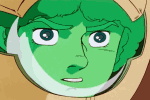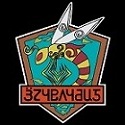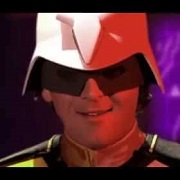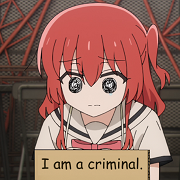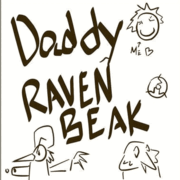|
That's a nice big hunk of plastic, but it ain't 25,000 yen nice.
|
|
|
|

|
| # ? May 14, 2024 04:35 |
|
So, going for another taste from the mech sampler platter, I finally tried an episode of Code Geass, just to say I had. Going in for specifics as opposed to generalities for a start, it surprised me how... inactive a protagonist Lelouch was for the whole first episode. He's not terroristing prior to getting super powers, he's not chasing after a lead when he finds C.C., he's not even interestingly wrong place wrong time. It's just the hand of the plot says "Hey, want the power of a god which no man can resist instead of dying? Cool. Enjoy terrorism." It makes it hard to think of Lelouch as this driven force of personality with real conviction when he grabs a terrorist's walkie talkie to try and bribe the military for safety, and it's tough to think of him as any kind of genius badass when he only survives episode 1 due to three separate perfectly timed coincidences that he had nothing to do with. (First that the soldier sent to kill him had no gun and was his long lost best friend, second that the truck driver managed to blow the truck just before Lelouch would be shot, and finally the whole getting superpowers thing). It's... odd. The show clearly wants us to be impressed with Lelouch, but it doesn't seem to notice how unimpressive the first episode paints him. (The last shot of him smiling as he gets covered in blood is nice, though. Just a moment of "This is hosed up... and I am 100 percent on board!") I feel like I should have something to say about the show overall as well, but I kind of... don't. Like, the blend of shows in Full Metal Panic feels straightforward. It's an 80s action movie with mechs alternating with a comedy about an 80s action movie protagonist going to high school. Code Geass, meanwhile, feels like it just jams everything in at once without clear intent beyond "It's cool, right?"
|
|
|
|
chiasaur11 posted:So, going for another taste from the mech sampler platter, I finally tried an episode of Code Geass, just to say I had. Episode 1 of Geass is one of those first episodes of a series that slams a ton of bang zoom explodey poo poo in your face all at once to try and hook the viewer and then the show backfills later. I think they calculated that they needed to get a ton of action and the obligatory cute show mascot girl on screen ASAP to lock in interest before doing serious world or character building. To extrapolate, the Lelouch you see in episode 1 isn't a driven force of personality with real conviction yet. He's a smug, self-superior kid who is incredibly smart and currently utilizes those smarts in frivolous ways, like scamming people for money, because that's the hand that life has dealt him. He definitely has past wounds that don't make him happy, but as of episode 1 he's pretty much resigned to the status quo, because he lacks the power to alter it meaningfully. When the power of a god quite literally falls into his lap by coincidence, that suddenly opens up the opportunity to start settling some of his personal grudges...but even then, he has to grow into it before he becomes the well-known Supersmug Laughing Genius Master Planner that Lelouch is popularly known for being. Honestly, it's one of my favorite parts of Geass. (some vague spoilers from here on out in case you wanted to continue watching) Lelouch's initial forays into being The Man With A Plan are relatively clumsy and involve insane amounts of risk, and he himself is not at all as much of a resolved hardass as he thinks he is at first. When he personally kills one of the first enemy commanders to fall into his trap(who happens to be his half brother), later on when he recalls the event he straight up vomits at the shock of what he did. He doesn't get used to what he's becoming or build up the callous immediately, it takes some time, and the show does bother to take some time to show it to you.
|
|
|
|
I would say the first episode is more about giving you a taste of various elements and the basic setting while going full speed ahead. It establishes why Lelouch finds his daily life to be boring, with the chess game barely being a challenge, yet he was still willing to try and help the people in the truck while disliking those who stood aside and did nothing. Even before the subsequent coincidence, he didn't hesitate to run and see what was happening down there. Episode 2 or so also portrays how he makes a couple more decisions during the same incident, so the entire context of the premise and the full scope of the personalities involved isn't fully available to you right away. Hard to judge convictions too much before then. Interestingly, since the new compilation movies arrange the flow of events chronologically, you get to see Lelouch's past right away instead of waiting for the reveals that take a few episodes to manifest. A TV show can afford to be somewhat more coy about that, but the movie should create a slightly different initial impression. Ep 1 still gives us a brief tease with the quick flashback right at the start, but you barely know what's going on. Kanos makes interesting observations and I agree with those. wielder fucked around with this message at 15:37 on Mar 1, 2019 |
|
|
|
Code Geass is a lot like the Benedict Cumberbatch Sherlock show in that it presents its lead as a brilliant thinker but it doesn't survive more than basic scrutiny. The earlier episodes (like, the first 13 or so) are probably the best because of how plain it is that Lelouch is merely very lucky and because the military engagements are relatively low key.
|
|
|
|
Schwarzwald posted:Code Geass is a lot like the Benedict Cumberbatch Sherlock show in that it presents its lead as a brilliant thinker but it doesn't survive more than basic scrutiny. To be honest, that's almost no different from a whole bunch of popular fiction, all the way from a classic Chinese novel such as Romance of the Three Kingdoms to the ongoing manga sensation that is Jojo's Bizarre Adventure. Both of which have a number of genius strategist characters that, upon closer inspection, are often not particularly realistic, benefit from luck and coincidence, or simply exploit the incompetence of their opponents. In fact, like the Geass power itself, some of their skills are better described as outright mystical in nature (for instance, see Zhuge Liang's ability to predict the weather or control the wind). Having said that, I don't think there's anything wrong with this. I wouldn't call Lelouch a brilliant thinker either. He's more of a trickster who does pull off a few clever stunts, but the character doesn't always win and can be held back by his own inexperience and immaturity too. I would argue there is a clear intent to portray a certain in-universe tension, in the sense that he isn't nearly as perfect as his own self-image or self-confidence would have you believe. wielder fucked around with this message at 18:07 on Mar 1, 2019 |
|
|
|
wielder posted:Having said that, I don't think there's anything wrong with this. I wouldn't call Lelouch a brilliant thinker either. He's more of a trickster who does pull off a few clever stunts, but the character doesn't always win and can be held back by his own inexperience and immaturity too. I would argue there is a clear intent to portray a certain in-universe tension, in the sense that he isn't nearly as perfect as his own self-image or self-confidence would have you believe. His victories are unearned and also his losses are unearned. He's not held back by his faults so much as he's held back by the plot deciding that he needs to lose now, and he doesn't triumph except when the plot decides he needs to win now. Things just seemingly happen arbitrarily. Lelouch stumbling across the Gawain, a mecha that just happens to be fifty times stronger than any previously shown, complete with flight and a wave-motion cannon, is a one particularly egregious example. The show is like the fanfiction version of an original story that we never see.
|
|
|
|
Schwarzwald posted:His victories are unearned and also his losses are unearned. He's not held back by his faults so much as he's held back by the plot deciding that he needs to lose now, and he doesn't triumph except when the plot decides he needs to win now. Things just seemingly happen arbitrarily. Lelouch stumbling across the Gawain, a mecha that just happens to be fifty times stronger than any previously shown, complete with flight and a wave-motion cannon, is a one particularly egregious example. Generally speaking, whether something feels "unearned" or not is an essentially subjective judgment. Other viewers may have felt differently. In fact, there are multiple opinions about Lelouch. We clearly have distinct interpretations and personal preferences here, which would prevent us from reaching the same conclusions about this subject in any case, but that generalization is not accurate to all of the facts. My recollection is that the show presents more variety in this respect. In a few words, it's not true of every single episode or every event. There are various situations in Code Geass where I would argue the contrary at length, because we were given enough information to conclude that Lelouch himself either explicitly or implicitly made decisions (or omissions) that resulted in his victory, stalemate or defeat. At other times, I would accept that something wasn't properly explained and should be taken at face value. In the end, everything that happens in a fictional story is always the result of an arbitrary decision by the author. This happens in Code Geass but also applies to multiple mecha series. It's an objective fact that main characters suddenly finding or stumbling upon a new powerful giant robot is one of the most common tropes in mecha anime history. For that matter, variations of this same concept are present in any number of games and JRPGs. Aside from that, I will note the Gawain isn't "fifty times" more powerful, so that bit of hyperbole is misleading. We see that Cornelia, for instance, was able to put up a fight against it using inferior technology. Beam weapons are often overpowered and that applies to the Gawain, but it isn't good for close combat. What can vary, of course, is how a particular event was implemented, portrayed or acknowledged within the boundaries of suspension of disbelief. Some stories are trying to be more realistic than others, so they build up a more detailed causality equation, so to speak, while others place far less emphasis on this in favor of other aspects. There is no universal rule, or at least there shouldn't be, forcing all kinds of stories to adopt the same methodology. Like a number of fictional stories that focus on soap opera and melodrama, Code Geass is not really attempting to present itself as a down-to-earth documentary on war, politics or science. Frankly, it's not even as realistic as the average Gundam show. But even that other Sunrise property tends to play rather fast and loose with certain incidents. I really like Zeta Gundam, for the record, but I could put on my cynical glasses and point out various arbitrary events within its story. Still, that doesn't usually bother me. I've accepted it. Incidentally, Romance of the Three Kingdoms has often been accused of feeling like fanfiction, in a way, due to how the historical events were modified to fit a strongly pro-Shu perspective, but it is still a classic novel that many generations have enjoyed reading. It's neither remotely realistic nor good history, yet those are not the only things people want from fiction. wielder fucked around with this message at 20:07 on Mar 1, 2019 |
|
|
|
I'm not quite sure what you're trying to say. I think you might be arguing against a point I'm not making.
Schwarzwald fucked around with this message at 20:34 on Mar 1, 2019 |
|
|
|
wielder posted:
I think the problem here is that a significant chunk of Code Geass isn't presented like a normal mecha - it's made clear multiple times that Lelouch is an average pilot at best - and most of the victories in most of S1 and early S2 are down to the actual group battlefield tactics involved (regardless of the dubiousness of said tactics, that's how the win's presented) rather than the individual abilities of a single suit. So while Kallen is an essential asset to his plans generally, she's still not typically winning the entire battle on her own. S2 in particular suddenly having literal super robots that actually ARE that "fifty times more powerful than anything else" and basically made tactics irrelevant was incredibly stupid. The ending was also eyerollingly dumb. Or more specifically, the "and then everyone lives peacefully" part, as if all the countries/factions/etc. that were briefly conquered aren't going to go right back to their century-long conflicts within a few months/years. That at least seems to have been walked back in later years in the leadup to them deciding on S3.
|
|
|
|
Schwarzwald posted:I'm not quite sure what you're trying to say. I think you might be arguing against a point I'm not making. Leaving aside my tendency to overly elaborate on the details and extend the implications, which can admittedly take more time to read and process, I am pretty sure each of your main points were addressed. If you want a more straightforward answer: you've said that every victory or defeat was arbitrary and unearned, so for you it's all fanfiction. I happen to disagree about this and explained why that isn't the case for me, plus why it doesn't really annoy me too much even when said criticism is valid. Lord Koth posted:I think the problem here is that a significant chunk of Code Geass isn't presented like a normal mecha - it's made clear multiple times that Lelouch is an average pilot at best - and most of the victories in most of S1 and early S2 are down to the actual group battlefield tactics involved (regardless of the dubiousness of said tactics, that's how the win's presented) rather than the individual abilities of a single suit. So while Kallen is an essential asset to his plans generally, she's still not typically winning the entire battle on her own. S2 in particular suddenly having literal super robots that actually ARE that "fifty times more powerful than anything else" and basically made tactics irrelevant was incredibly stupid. To be fair, that's a rather distinct argument, but sure. I would point out we still saw plenty of standard mecha show tropes all along, even if they involved people like Suzaku or Kallen. Still, the tech upgrades did lead to some issues. I didn't like how the mecha combat often became less interesting to watch in S2 either. There were exceptions to the rule even in R2, mind you, yet the average KMF encounter during S1 was more dynamic in comparison. Even though folks may have mixed views about Akito the Exiled, I liked how that OVA tried to re-interpret KMF combat by using a more elaborate form of choreography. Based on my experience, I thought the ending implied the peace was a moment of relief to let people take a break for the purpose of reorganizing the world into a better place. Not something that would last forever, since the narration briefly alluded to some problems remaining. Of course, the story had to end somewhere rather than keep going, so we were left on a happy note, but nothing was absolutely certain.
|
|
|
|
Flying is a huge part of the Geass power level problem. The original's battles were neat rollerskating mechs doing cool guerilla mobility tricks in heavily urban combat situations, and frankly a shocking fraction of Lelouche's brilliant plans amounted to "perfectly placed bombs." Cut to R2 and it's all armies of mechs with flight packs and huge beam cannons staring at each other to seem epic.
|
|
|
|
chiasaur11 posted:So, going for another taste from the mech sampler platter, I finally tried an episode of Code Geass, just to say I had. Speaking of the mech sampler platter, Macross Frontier is on YouTube, subbed in 720. https://www.youtube.com/watch?v=VnBgMIYA874
|
|
|
|
mllaneza posted:Speaking of the mech sampler platter, Macross Frontier is on YouTube, subbed in 720. Definitely a pro watch if you have any love for musical punchplanes. It's not the cleanest show, either artistically or writing-wise, but it's a nicely complete package that starts well, ends well, and keeps up the tempo pretty decently throughout its run, and still looks and sounds pretty great even with the aging CGI and occasionally slipshod character art. Episode 7 is still one of the best action experiences in mecha anime, and works pretty well as a twenty-minute taster for the show. Darth Walrus fucked around with this message at 02:44 on Mar 2, 2019 |
|
|
|
Darth Walrus posted:Definitely a pro watch if you have any love for musical punchplanes. It's not the cleanest show, either artistically or writing-wise, but it's a nicely complete package that starts well, ends well, and keeps up the tempo pretty decently throughout its run, and still looks and sounds pretty great even with the aging CGI and occasionally slipshod character art. Episode 7 is still one of the best action experiences in mecha anime, and works pretty well as a twenty-minute taster for the show. I'd mostly agree with this. I think the movies fix some of the story issues with the original show, even if they had to create an alternate retelling in the process, but Macross Frontier is worth checking out. Caphi posted:Cut to R2 and it's all armies of mechs with flight packs and huge beam cannons staring at each other to seem epic. At that point it's functionally the same as Gundam technology. Which has led to similar problems in the past, at least on occasion, though some Gundam shows get around it by either improving the animation and choreography or trying to come up with interesting scenarios even if the tech is still overpowered. Honestly, I get the feeling there wasn't a ton of mecha animation budget and manpower available in R2 until the last few episodes, where we do get to see a proper final fight that's got several stages and more going on. Which was a pleasant surprise after not liking the battles around the middle of the season. wielder fucked around with this message at 05:04 on Mar 2, 2019 |
|
|
|
did the delta movie fix any of that show's problems?
|
|
|
|
gimme the GOD drat candy posted:did the delta movie fix any of that show's problems? Nope. It's worse by far.
|
|
|
|
dangit.
|
|
|
|
Darth Walrus posted:Definitely a pro watch if you have any love for musical punchplanes. It's not the cleanest show, either artistically or writing-wise, but it's a nicely complete package that starts well, ends well, and keeps up the tempo pretty decently throughout its run, and still looks and sounds pretty great even with the aging CGI and occasionally slipshod character art. Episode 7 is still one of the best action experiences in mecha anime, and works pretty well as a twenty-minute taster for the show. I really loved Frontier and was moderately enthusiastic about Delta. Based on that, what should I watch next ?
|
|
|
|
mllaneza posted:I really loved Frontier and was moderately enthusiastic about Delta. Plus if you haven't seen it.
|
|
|
|
Check out this cool video by former ADTRW mod, Zorak: https://www.youtube.com/watch?v=Ch6ls9J8SfI
|
|
|
|
Huh. I never knew he had the voice of a guy narrating his childhood misadventures in the manner of The Wonder Years. Good for him.
|
|
|
|
Kanos posted:Plus if you haven't seen it. I have !
|
|
|
|
Schwarzwald posted:Check out this cool video by former ADTRW mod, Zorak: I never placed the Leo as Zaku inspired/stand-in. Thanks for this!
|
|
|
|
Ranzear posted:I never placed the Leo as Zaku inspired/stand-in. Thanks for this! The serial number is a big clue - it's the OZ-06.
|
|
|
|
Ranzear posted:I never placed the Leo as Zaku inspired/stand-in. Thanks for this! Odd to have the Man Rodi as the Zaku instead of the Graze, though. The Rodi is pudgier, but the Graze's role, number designation, and axe are all a closer match.
|
|
|
|
So...so expensively cheap!
|
|
|
|
chiasaur11 posted:Odd to have the Man Rodi as the Zaku instead of the Graze, though. The Graze could be the Gouf instead, particularly with
|
|
|
|
Same spoiler warning as last time. Brave Police J-Decker - The One With Heart J-Decker is the story of Tomonaga Yuuta, a young boy living in Tokyo that strikes up an unlikely friendship with a police robot named Deckard he finds by chance, which in turn causes Deckard to develop emotions. They then become the first members of the new Brave Department of the Tokyo Police and fight together to stop crime. It feels like every Brave show after the first two had a different twist on the formula: Da Garn was far less episodic, Might Gaine was structured like a superhero show, and now J-Decker's twist is something I've been looking forward to for a long while: The robots finally have personalities! J-decker has once again returned to an almost completely episodic format. Just like Might Gaine there isn't a central villain until the very end of the show, and instead there are several independent criminals who aren't working towards the same goal. Unlike Might Gaine however they're not a small group of recurring characters but instead usually just a villain of the week. While I can understand some people being put off by this if they want a more interconnected story I think it fits the police theme of the show very well, and it also escapes the problem of the villains always conveniently escaping by the end of the episode several of the previous Brave shows had. There were also a few times an earlier villain did return and it always caught me by surprise when they did. Yuuta himself feels like a return to the audience-stand in type protagonist from the first two Brave shows, he's basically a normal kid thrown into extraordinary circumstances, though his friendship with Deckard is given a lot of focus and he has a stronger sense of justice than you'd expect from a nine-year-old. Much like Seiji he commands the robots while they work, and while he doesn't necessarily give any more complex orders than Seiji did I do find it easier to swallow since he was instrumental in their creation, and that they're all working in a pre-existing organizational structure helps as well. I was pleasantly surprised by the size of the supporting cast. I was afraid with the robots finally being actual characters that would mean they would compensate by having fewer human characters, but on the contrary I think J-Decker might have the largest cast of returning human characters in the franchise so far. The cast consists of Yuuta's sisters, their neighbors, their superiors at the police and every robot has one particular human or group of humans they form a very close relationship with. A couple of times these relationships are even explicitly romantic, which is a bit odd but I like it. I do appreciate that there's one guy at the police who is incredibly skeptical of Yuuta and the Braves. He always ends up being wrong of course, but everyone being totally cool with a child becoming a police officer would feel incredibly contrived. The robots follow a very similar formula to the previous shows, though they now only have one supporting combiner team, with the other one being replaced with a single non-combining ninja robot with 6 different modes (His toy is a remold of Transformers' Sixshot). There's a cute detail in that they all have more human-sounding names, though some work better than others. The robot that transforms into a crane truck is named McCrane and it's great, while the robot that transforms into a dumptruck is called Dumpson and it's not so great. The upgrades and later team members are mostly introduced apropos of nothing rather than being a response to escalating threat, but the fact that it's now a fun new addition to the cast rather than just another toy that shows up on screen makes that far less of a problem than it was in previous shows. J-Decker's replacement and final form are the exceptions to this, as much like Might Gaine J-Decker is defeated before the upgrades. This time the show even entertains the idea that Deckard could die, whereas Might Gaine immediately mentioned Gaine just needed to be repaired before he could return. The action was quite similar to the previous shows with one notable exception: No stock footage final moves. This quite surprised me at first, and it makes the fights feel less predictable. At the same time though I kind of missed the stock footage super moves, they're part of the charm! One thing I don't think I've mentioned before is that the stock footage in all the Brave shows is noticeably more well-animated than the rest of the shows. While this is still the case in J-decker it feels like the gap is smaller now so it's less jarring. I mentioned in my Might Gaine review how I was pleasantly surprised by the subject matter of some of the episodes. This is still true but those episodes were the exception rather than the rule. In J-decker though nearly every episode after the first 10-15 (when the show was still finding its legs) either deals with one of the Braves' personal struggle or explores what it means to be a person. Because of this the show has the strongest thematic thread of any Brave show so far, with most episodes directly relating to the main theme of the show. I also want to mention that while all the earlier Brave shows Changed their OP and ED once about halfway through to reflect all the new robots and upgrades, J-Decker updated the animation every time a new Brave was introduced. It's a small thing but I really appreciated it. To conclude, J-Decker is really, really good. It fixed my main issue with the franchise so far, and while it doesn't have the more long-form storytelling of Da Garn or Might Gaine it more than makes up for it with its many personal and thoughtful episodes. If you have any interest in the Brave franchise whatsoever you should definitely watch this one. Traditions: Main robot gets damaged and replaced and then combines with its replacement, with yet another robot turning into a weapon. This time however the weapon-robot was introduced before the replacement and the replacement itself is now a small robot that combines with a non-sentient vehicle just like the main robot. Lion chest returns in a sense, with the support combiner having a tiger face on its chest, which becomes a saber toothed tiger when it upgrades. Only one side team this time, though they still do the 3+1 combination scheme. Instead of a second side team there is a single non-combining robot. Drill tank returns as Drill Boy, the fourth member of the side team.
|
|
|
|
That was an excellent write up!
|
|
|
|
I'm hoping some people here might be able to help me with a project. I am looking to find images of Go Nagai, Ken Ishikawa, Yoshiyuki Tomino and Tadao Nagahama, circa the 70s. I also like to know the source to give credit. (Which is why I can't just rely on GIS.) If anyone is able to help out with this, I'd gladly give a shout out in the finished work. Either your internet handle or whatever you prefer.
|
|
|
|
Same spoiler warning as usual. Golden Brave Goldran - The Funny One Goldran follows the adventures of Takuya, Kazuki and Dai, three young boys who find a mystical gemstone known as a Power Stone by chance. When they hold it aloft and recite an incantation the stone transforms into the golden swordsman Dran who tasks them with finding the other 7 Braves. Doing so will open the path to Legendra, a paradise and the Braves' home. However, they are pursued by Walter Walzac, crown prince of the Walzac empire, who also wants the Power Stones as he believes Legendra can bestow ultimate power to his empire. Right off the bat Goldran breaks convention by having 3 children befriend the Braves rather than just the one all the previous shows had. Takuya is still clearly the protagonist but they all contribute to every episode and bounce off each other well. Takuya is sly and clever, Kazuki is book smart and has a great memory and Dai is strong but sensitive and is clearly the moral center of the group. I mentioned in J-Decker I was impressed with the size of the cast, but Goldran goes the other way and has the smallest recurring cast in the franchise so far, consisting only of the 3 kids, the Braves and the villain and his supporting cast. To make up for the small central cast Goldran is structured like an adventure show, where every episode the heroes and villains go to an exotic locale (all of which are real locations with the serial numbers filed off) in search of Power Stones, interact with some of the locals and/or explore a mystical location, have a robot fight and then wave goodbye, never to see the characters in that episode again. The focus is on the sense of adventure and exploration rather than the character-focused stories of J-Decker. The other major focus of the show is comedy. I haven't mentioned the comedy aspects of previous Brave shows much because the jokes very usually pretty rare and fell flat for me most of the time, but Goldran is pretty consistently funny. The characters all bounce off each other well and they always end up in amusingly ridiculous situations, like the episode where the children's homeroom teacher has to fight a pro-wrestler for a Power Stone. I mentioned in my Exkaiser review that I found all the villains being comedically incompetent was a problem but it does work better here: In Exkaiser we were supposed to think they were funny in their idiocy while at the same time being legitimate threats which ended up weakening both aspects, but in Goldran even during the robot battles it's clear that Walter is essentially a clown you're supposed to laugh at and it ends up more consistent than Exkaiser was. Structurally Goldran is a mix of the first 3 Brave shows: There's a consistent villain they fight every episode like Exkaiser and Fighbird, and finding all of the Braves is part of the plot like in Da Garn with the added twist that this time both the heroes and the villains want the Power Stones, so every episode turns into a kind of race. Halfway through the show however there's a major change to the status quo, with Walter and his supporting characters switching sides and being replaced with new villain and the whole show moving to space as it turns out Legendra is another planet. The new villain, Sirius, works very well as a bigger threat than Walter because, while no more successful in defeating the heroes than Walter was, he is an entirely serious and ultimately tragic character. As usual the main robot is temporarily replaced about halfway through the show, but this time it's not just him that's taken out of action but all of them. This gives the new guy some time to shine on his own before they all inevitably come back, and I found the way they tied their return into Walter's redemption arc quite clever. After watching J-Decker I was afraid that giving the robots more personality would be a single-series gimmick and unfortunately, Goldran proves me right. While the Braves have more character than they did in, for example, Might Gaine the focus is very much on the human characters, though there are a few episodes that focus more on the Braves themselves. This is especially a shame since I feel that comedy shows really benefit from having more characters, so you can use their eccentric personalities for jokes. I was pleasantly surprised however that they introduced a new robot after the main robot's final upgrade. In most Brave shows they introduce new robots at a reasonable pace until the main robot's final form in the mid 30 episodes and then there's nothing new for the last quarter of the show, but adding yet another one after that and also having it combine outside of the pre-established Brave formula meant Goldran kept intoducing new stuff right until the very end. Action-wise this show is pretty good for the first half, the stock-footage finishing moves return after their absence in J-Decker and while they do make fights more formulaic I'd be lying if I said it wasn't nice to have them back. The more consistent animation quality I mentioned in my J-Decker review is also still here which is quite nice. The action suffers a dip in quality once they introduce the final form of the main robot however. For about ten episodes straight it performed its finishing move as soon as it combined, essentially making it an instant win button which made the fights very boring and samey, even by Brave standards. This isn't as big a problem as it could be since the show focuses more on comedy than action anyway, but it is still a bit of a shame. The action does get better again towards the tail end of the show though. In conclusion, Goldran is a pretty good Brave show. While it doesn't reach the heights J-Decker did for me its focus lies elsewhere and I can respect that. It mostly wants to make you laugh and at that it succeeds. It also pulled on my heartstrings quite a bit during the more serious moments towards the end of the show, so if you're in for something silly with more heart than you'd initially think I'd recommend it. Traditions: Main robot gets damaged and replaced and then combines with replacement, and the replacement itself is also a combiner, just like J-decker. The only difference is instead of having a robot becoming a weapon Goldran has a robot becoming a flight pack. Lion chest returns for Great Goldran, the final form of the main robot. Yet again only one side team with the standard 3+1 combination scheme. Drill tank returns in the form of Drill Silver, who becomes the legs of the 3+1 combiner. Returning from J-decker we have a ninja robot, the aforementioned flight pack for Goldran.
|
|
|
|
TL;DR: https://www.youtube.com/watch?v=WmT0HPQPAoo Has Captain Shark 11/10
|
|
|
|
captain shark do doo do doo do doo
|
|
|
|
|
I'm excited to watch Goldran, it hadn't really been on my radar before but it honestly sounds right up my alley. The switch to space halfway through sounds really neat.
|
|
|
|
dogsicle posted:captain shark do doo do doo do doo 
|
|
|
|
Continuing my plan this year of watching as many first episodes of Gundam as possible, I tried out Metal Armor Dragonar today. First off, the subs I had were pretty bad. Not full on Duwang, either. Just the boring kind of bad. So, if the original had dialog that would have made Elmore Leonard whistle in envy... well, that virtue is missing. Show's just going to have to be judged on its other merits. We open with a shot of a military convoy being stopped by a cute child's herd of sheep... before everyone is killed by a meteor. To be clear, I'm not outright opposed to killing small children in mech anime. My recorded enthusiasm for Iron Blooded Orphans and the works of Yoshiyuki Tomino would make me a hypocrite if I was. But I'm not sure it was a good move here, since it's ten percent of the episode spent establishing nothing except the bad guys are bad, and also they like to drop meteors on things. If the show wants a bleak tone, sure, it's a way to establish that, but when the rest of the episode is lighter, it feels a little odd. Where the original Gundam did a bit to flesh out all the main factions, Dragonar is less successful. The enemy commander is generic, the military is just doing the mission, and our three heroes feel like the only people in their entire colony. Instead of showing the cramped emergency shelters and Fraw's family dying right next to her, we just hear about refugees and evac shuttles in dialog from an air traffic control room, with about the passion you expect from an air traffic control room. Where Amuro felt like part of a world, an ordinary shut-in nerd who happened to wind up in the cockpit, Tapp and the others are clearly protagonists from the start, dodging ridiculous amounts of gunfire and explosions before they even get in a robot. What's more, they've got some responses to things that feel really incongruous. When they get to the mechs, they talk about them being "out of a manga". Despite this being midway into a war where the villains have taken over 70 percent of the Earth using mechs. Mechs should not be a strange and surprising thing at this juncture. Still, I will say that the last shot of a meteor gun punching through the hero's home colony worked okay. It's not like this was total garbage or anything. It's just easy to see why this didn't steal Gundam's thunder.
|
|
|
|
https://twitter.com/Yuyucow/status/1120376589068447744
|
|
|
|
What is this anime and how do we kill it?
|
|
|
|

|
| # ? May 14, 2024 04:35 |
|
TaurusOxford posted:What is this anime and how do we kill it? RoboHachi. And it depends on what genre we're in. I think we can narrow it down to bravery, friendship, or emotionally traumatizing a teenager and shoving them in a multi-billion dollar superweapon. One of those usually kills things.
|
|
|



